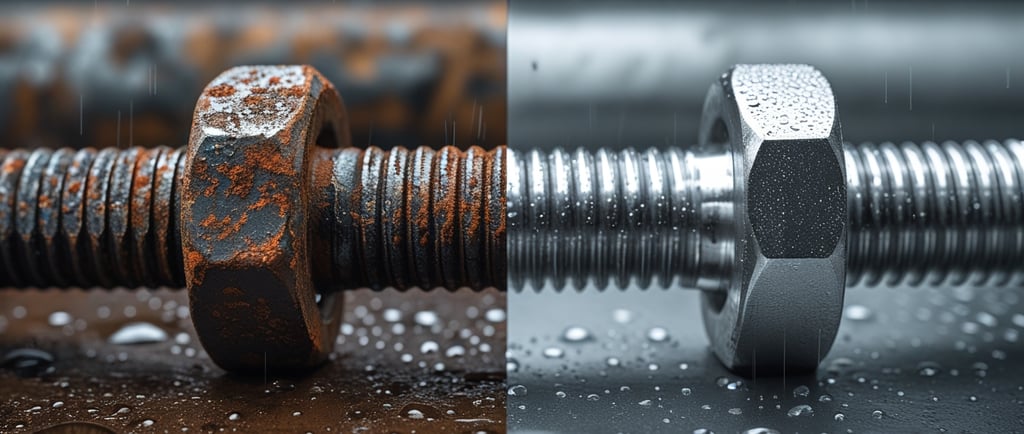How to Prevent Rust on Fasteners: Expert Tips for Longevity
Learn expert tips on how to prevent rust on fasteners. Discover the best coatings, materials, storage practices, and maintenance routines for long-lasting performance.
GENERAL & INFORMATIVE ARTICLES


Introduction
Rust is one of the biggest enemies of fasteners, especially in environments exposed to moisture, humidity, or chemicals. Whether you're a contractor, engineer, or DIY enthusiast, you’ve likely faced the frustration of corroded bolts or screws that compromise the strength and durability of your project.
Fasteners may be small, but their role is huge—holding together everything from homes and high-rises to furniture and machinery. When rust sets in, it not only weakens the fastener but also risks the entire structure. That’s why understanding how to prevent rust is critical for long-term reliability.
In this blog, we’ll cover why rust happens, which fastener materials are best for rust prevention, and practical expert tips to ensure your fasteners last longer—saving you time, money, and frustration.
What Causes Rust on Fasteners?
Rust is a form of iron oxide that forms when metal reacts with oxygen and moisture over time. In fasteners, rust typically develops due to prolonged exposure to rain, humidity, chemicals, or salt (common in coastal regions).
Key causes of rust include:
Poor-quality metal with low corrosion resistance
Lack of protective coatings or plating
Installation in high-moisture or chemical-prone environments
Improper storage or exposure to the elements before use
Types of Corrosion in Fasteners
Understanding corrosion types helps in selecting the right preventive measure:
Uniform corrosion: General rusting that spreads evenly across a surface.
Galvanic corrosion: Occurs when dissimilar metals contact each other in a wet environment.
Crevice corrosion: Happens in tight spaces where water or moisture is trapped.
Pitting corrosion: Localized damage that forms small holes or pits.
Each type weakens the fastener’s performance, especially in structural or load-bearing applications.
Best Materials for Rust-Resistant Fasteners
Choosing the right material is your first line of defense against rust. Here are the top options:
1. Stainless Steel
Highly corrosion-resistant, especially grades like 304 and 316.
Ideal for: Marine, chemical, and outdoor applications.
Bonus: No coating needed—rust protection is built-in.
2. Hot-Dip Galvanized Steel
Steel coated with a thick layer of zinc to resist corrosion.
Ideal for: Construction, outdoor framing, fences, and decking.
Note: Zinc may wear off over time in harsh conditions.
3. Zinc-Plated Steel
Electroplated with a thin zinc coating.
Ideal for: Indoor projects with low humidity.
Caution: Not suitable for outdoor or marine use.
4. Silicon Bronze and Brass
Non-ferrous metals with natural corrosion resistance.
Ideal for: Coastal applications and aesthetic hardware.
5. Coated Fasteners (Ceramic, Epoxy, etc.)
Advanced coatings designed to add a protective layer.
Ideal for: Harsh industrial or chemical environments.
Proven Methods to Prevent Fastener Rust
Even with the right materials, rust prevention is a multi-step process. Here’s how professionals do it:
1. Use the Right Coating or Plating
Coatings create a protective barrier between the metal and moisture. Common options:
Zinc Coating: Budget-friendly and widely used.
Epoxy Coating: Excellent for chemical resistance.
Hot-Dip Galvanization: Best for outdoor construction.
Ceramic Coating: High-performance, corrosion-resistant for automotive or marine.
2. Avoid Mixing Metals
Galvanic corrosion occurs when different metals (like aluminum and steel) touch each other in wet environments. To avoid this:
Use fasteners made from the same metal as the material they’re fastening.
Or, use plastic/rubber washers or bushings to prevent metal-on-metal contact.
3. Apply Anti-Rust Spray or Sealant
For projects already installed, applying a rust-inhibiting spray helps extend fastener life.
Use silicone-based or oil-based protectants.
Reapply regularly for best results.
4. Store Fasteners Properly
Rust can start even before installation if fasteners are stored poorly.
Store in a dry, cool environment.
Use sealed containers or desiccant packs to absorb moisture.
Avoid keeping fasteners near chemicals or salty air.
5. Use Thread Lockers and Sealants
Sealants like thread lockers help block moisture from penetrating the fastener threads.
Added benefit: Prevents loosening from vibration.
Use appropriate grades based on removal needs (e.g., medium vs. high strength).
6. Ensure Proper Drainage in Installations
Water pooling around fasteners accelerates rust.
Design structures with adequate drainage.
Angle fasteners or surfaces to allow water to run off.
Use washers to prevent crevice corrosion.
Common Rust-Prone Applications and What to Do
Outdoor Decking and Framing
Use hot-dip galvanized or stainless steel screws.
Avoid low-cost zinc screws which rust quickly outdoors.
Marine and Coastal Construction
Use 316-grade stainless steel or bronze.
Apply marine-grade sealants and inspect regularly.
Automotive and Heavy Machinery
Use ceramic-coated or zinc-nickel plated bolts.
Regular maintenance and lubrication are key.
HVAC and MEP Installations
Use coated anchors and fasteners.
Avoid moisture traps inside ducts or near water systems.
Long-Term Maintenance Tips
Preventing rust isn’t just about installation—it’s also about upkeep:
Inspect regularly: Look for signs of rust, discoloration, or flaking.
Replace damaged fasteners: Don’t wait until failure occurs.
Clean buildup: Dirt or salt can trap moisture and start corrosion.
Reapply protective coatings: Especially in exposed outdoor settings.
Conclusion
Rust on fasteners is not just an aesthetic issue—it’s a structural threat. By choosing the right materials, applying effective coatings, and maintaining proper storage and installation practices, you can dramatically extend the life of your fasteners and your projects.
Whether you're building a high-rise in the UAE or assembling outdoor furniture, rust prevention is key to performance and safety. Remember, spending a little extra on rust-resistant fasteners and protective measures today can save you from costly repairs or replacements tomorrow.
Call-to-Action
Looking for rust-proof fasteners at competitive prices? Contact Bait Alnuhas today—we supply a wide range of stainless steel, galvanized, and coated fasteners across the UAE!
